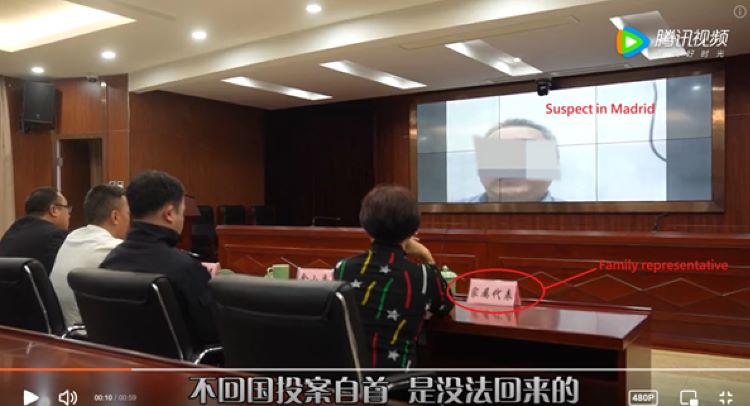Eduardo González
Spanish MEP Ignacio Sánchez Amor (PSOE) has submitted a question to the European Commission regarding alleged unofficial operations by Chinese authorities in Spain and other Member States that could lead to violations of the procedural and political rights of Chinese citizens fleeing from justice in their country and residing abroad.
The parliamentary question is based on the conclusions of the report 110 OVERSEAS – Chinese Transnational Policing Gone Wild, by the NGO Safeguard Defenders, published last September, according to which the Chinese authorities are using a network of “police service centers abroad” established in fifty countries around the world to bring alleged fugitives from Chinese justice back to the country.
According to the report, the Chinese police, “in coordination with the Overseas Chinese Association, led by Chinese Communist Party entities,” have established a series of “overseas police service stations,” particularly in Europe, through which they have allegedly “persuaded” some 230,000 alleged Chinese fugitives to return home. As a means of pressure, Chinese officials use the relatives of the fugitives.
These centers are said to be distributed in numerous countries, including some EU member states, such as Spain, Portugal, France and Germany, and their operations are said to take place outside official bilateral police and judicial cooperation. According to the NGO, Spain is the country with the most centers, specifically nine (three in Madrid, three in Barcelona, two in Valencia and one in Santiago de Compostela), a figure that could be “much higher” (up to five times higher) because only the centers related to two jurisdictions, Fuzhou and Qingtian, where most of the Chinese residents in Spain come from, have been detected.
In addition, the report states that one of the centers in Madrid has collaborated with the Chinese police to obtain the arrest of a suspect surnamed Liu, resident in Spain, who was wanted for environmental pollution in China and who was persuaded to return to his country and surrender to the authorities on January 14, 2020. To “persuade” him, the Chinese authorities, in coordination with the County Overseas Chinese Federation (COCF) and the Qingtian Association of Spanish Citizens (QHAS), held a video meeting with Liu that was attended by a relative of the suspect, who appears in the meeting seated next to the officials and wearing a name tag with the slogan Family Representative.
Violation of rights and persecution of opponents
These police actions, Sánchez Amor told The Diplomat, not only violate international law (since they are carried out outside the countries concerned and, therefore, above the principle of national sovereignty and diplomatic and extradition procedures), but also violate the rights of the accused, who, as residents of Spain, are “protected by the Constitution and the law”. “No one can be required, retained or persecuted by their country of origin in conditions different from those of any Spanish citizen,” he recalled.
Likewise, he warned, “the Chinese authorities can consider opponents as criminals” and use their relatives as a “form of pressure” to force them to surrender. “This is a common procedure between authoritarian governments, between China and Turkey, for example, but it should not reach democracies,” continued Sánchez Amor, who recalled, in this regard, the controversy that occurred recently in the United Kingdom for the alleged assault on a man who participated in a protest in front of the Chinese Consulate in Manchester after being dragged inside the diplomatic compound.
For all these reasons, Sanchez Amor has submitted a question to the European Commission, in his capacity as a member of the European Parliament’s Special Committee on Foreign Interference in all EU Democratic Processes, in which he urges the Community Executive to clarify “what credibility the Commission gives to this report” and asks, on the one hand, if it is “in contact with the authorities of the Member States in relation to these alleged operations and the existence of the so-called Chinese centers of police services abroad” and, on the other hand, and “in case of authenticity of the information, what measures will the Commission take to counteract this alleged foreign interference”.
Interior Ministry sources quoted by the newspaper El Correo have assured that these reports are being investigated, without giving further details and without clarifying whether they were previously aware of these facts. The Chinese Embassy has not responded to the questions of the same newspaper, although it has confirmed that at least two of the businesses in Madrid mentioned in the report cooperate with the Chinese Police, specifically, the editorial office of a digital newspaper and a law firm. Likewise, sources from the Chinese Ministry of Foreign Affairs have confirmed on condition of anonymity the existence of these operations, which they have justified by the slowness and complexity of bilateral treaties on extradition.







